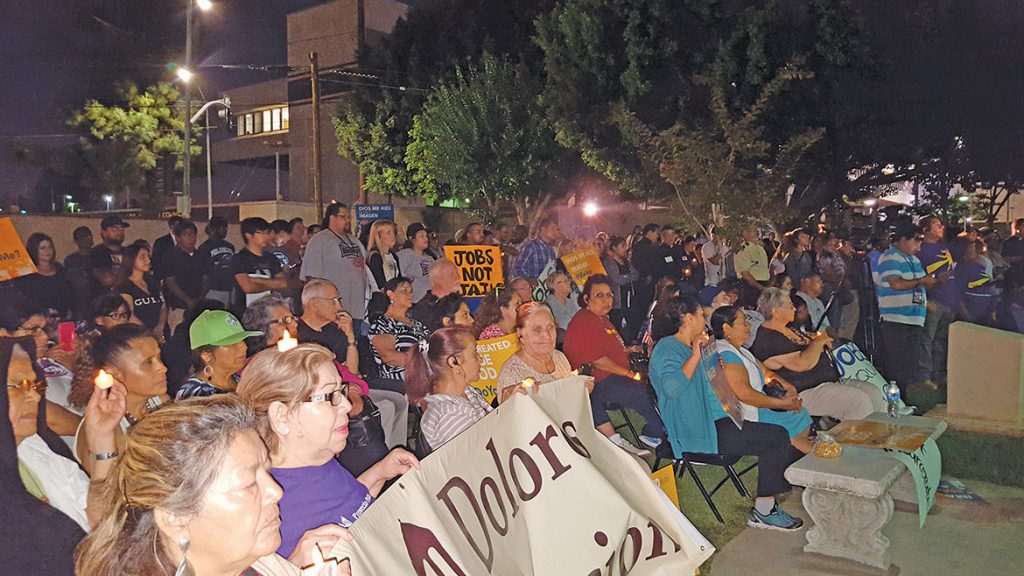An interfaith Prayer Vigil for Dignity and Justice was held outside the Men’s Central Jail in Downtown Los Angeles the evening of Sept. 29, with several hundred men, women and children in attendance — representing diverse races, cultures and religious traditions — to stand together in solidarity with Pope Francis’ message against mass incarceration and racial injustice.
“It is painful when we see prison systems which are not concerned to care for wounds, to soothe pain, to offer new possibilities,” said Pope Francis to the detainees he visited with at Curran-Fromhold Correctional Facility in Philadelphia during his recent first-ever trip to the U.S. “It is painful when we see people who think that only others need to be cleansed, purified, and do not recognize that their weariness, pain and wounds are also the weariness, pain and wounds of society.”
Participants on hand for the prayer vigil included community and church members, religious leaders, immigrants, low-wage workers, former inmates, relatives of incarcerated men and women, and other supporters.
Special guests included recently-ordained San Gabriel Region Auxiliary Bishop David G. O’Connell; Jesuit Father Gregory Boyle, founder of Homeboy Industries; Marqueece Harris-Dawson, a member of the Los Angeles City Council; Rusty Hicks, executive secretary-treasurer of the L.A. County Federation of Labor; Dr. Mark Labberton, president of Fuller Theological Seminary; and many others.
The scheduled speakers addressed issues that disproportionately affect immigrant, low-income and minority communities, including the need for criminal justice reform (to include rehabilitation, etc.), increasing minimum wage to livable levels and ending mass deportations that break families apart.
“Last week the pope gave me a vision of what it means to be a real pastor, because he is somebody who sees those who are suffering, who sees those who are rejected,” said Bishop O’Connell, noting that this fact was evidenced by Pope Francis opting to visit a homeless shelter in lieu of dining with Congress, and to visit with prisoners.
“He wanted to spend time with the people who are not seen. Above all else, I think Pope Francis was speaking like an organizer,” he added. “He said we must create a culture of encounter, where we see each other and talk to each other. … The other thing that the pope talked about … is the [upcoming] Year of Mercy — it’s a year for us to take the actions of mercy and compassion and forgiveness … to make sacrifices, to do something to help somebody else.”
Organized by L.A. Voice, a local nonprofit that unites diverse faith and community groups to help improve quality of life for all Angelenos, the gathering also featured testimonials, prayer, song and a foot-washing ritual, with faith leaders washing the feet of immigrants, former inmates and low-wage workers.
“Life means ‘getting our feet dirty’ from the dust-filled roads of life and history — all of us need to be … washed,” explained Pope Francis at Curran-Fromhold.
A common theme throughout the evening — and emblazoned on blue and gold signs held aloft by participants — was about all humans being created in the image of God, and, as such, deserving of respect, compassion, mercy and second chances.
“I am created in the image of God — do you see me?” stated the bold signs.
One of those people hoping to be seen is Rafael Cabrera, a former prison inmate who shared a powerful testimony in support of the Fair Chance Initiative, intended to help remove barriers to employment for qualified workers with criminal records.
When Cabrera was 15 years into a nearly 30-year sentence, he received a surprising letter from a woman named Connie, the mother of the young man he had killed.
To his utter shock, Connie gave him the ultimate gift of mercy, compassion and forgiveness, writing, “It wasn’t easy, but I’ve learned to forgive you, and I learned that if [Mary] could forgive those who killed her son on the cross, I could forgive you, and if she can call them her sons, then I could call you my son, if you let me.”
“Connie is seeing through God’s eyes … and if the whole world could, it would be a better place for a lot of people, and that’s what Fair Chance is all about,” Cabrera said.
For Imelda Gomez, a parishioner at Blessed Sacrament Church in Hollywood for over 30 years, the vigil was inspirational, motivating her to “do whatever I can.”
“I came here tonight because I like to help people, [and] because I was once down and out myself — I know what it’s like to suffer, to be hungry, to be looked down upon with contempt; that’s why I’m here,” Gomez told The Tidings.
“I don’t have much so I can’t give much, but I’m here to share my presence, my support and my good intentions with those in need. … We’re all human beings and we have to help each other, because through unity we find our [collective] strength.”

